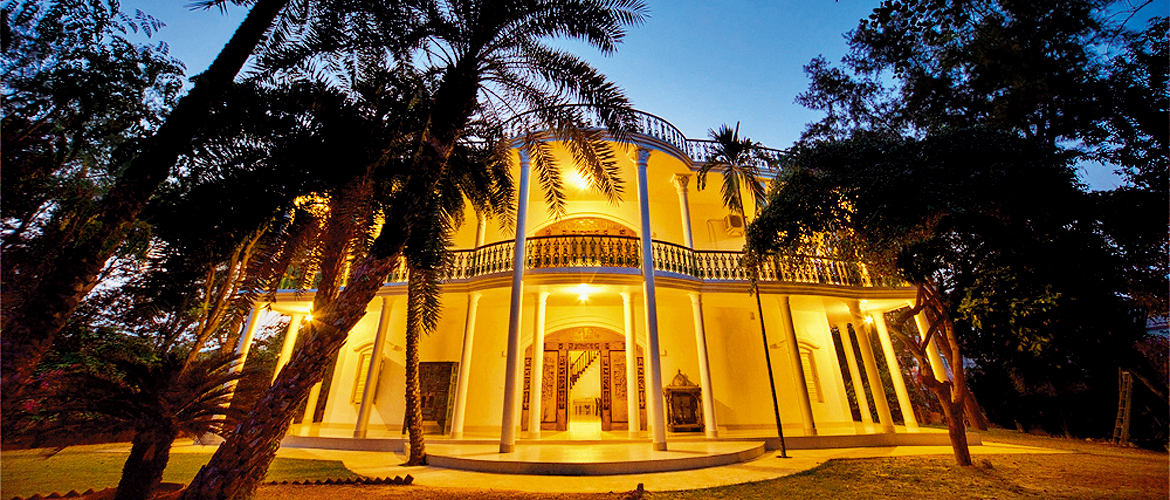Call it artistic fancy and everything falls into place. How else do you explain the two dressers
“The Garden Bungalow was conceived as an installation art and not a mere place to stay,” Ranojay Bhattacharyya, managing director, helpfully explained as we sat on the lawn enjoying tea and cutlets. Around us, the wind buffeted the branches of the trees while clouds loomed overhead.
In 1861, Debendranath Tagore, while travelling through Birbhum district in Bengal, was drawn by the sight of a chhatim tree in the middle of the barren red earth. A member of the Brahmo Samaj, he built an ashram here and filled the place with greenery. So, when his son Rabindranath decided to start a gurukul, he chose Santiniketan or the ‘abode of peace’ built by his father. The small school eventually became the globally famous Visva-Bharati University.
The little that I saw of the township revealed that booming real estate was overrunning the once pristine surroundings. Thankfully, the Bungalow, located at the edge of the Sonajhuri forest and surrounded by a sprawling garden, retains a feel of the original landscape. A Santhali village, a couple of homesteads, two large village ponds, and a flower nursery were its immediate neighbours.

At the Bungalow, I walked up a strip of ranga matir poth, reminiscent of the red laterite paths of Birbhum, and stared up at a structure that displayed traditional architecture with colonial trimmings, a throwback to the homes of zamindars and19th-century aristocrats. Columns with simply designed capitals marched along the circular balcony and the covered porch. Windows with louvred shutters punctuated the walls of the two-storeyed building. The arched wooden doorway sported carvings by artists from Dinajpur. “The Bungalow was not designed by an architect. It is a blend of the efforts of a sculptor, a painter and a gardening enthusiast,” said Bhattacharyya.
But the description didn’t prepare me for the surprise when I stepped inside. It was a jaw-dropping moment. To my left was a floor-to-ceiling mirror. Time may have dimmed the carvings along the wooden frame but the Belgian glass threw back a perfect reflection. Placed in front of it was a flat vase full of flowers on a jol-chouki, a traditional low table. Other pieces of period furniture were strewn around the spacious hall. A polished wooden spiral staircase led to the upper storeys. “Most of the pieces here are antiques procured from different corners of Bengal,” said Bhattacharyya. “The mirror is from an old home in Burdwan. Even the spiral staircase and the louvered shutters of the windows are from old aristocratic homes.”

The bungalow sits at the heart of a three-odd-acre compound. There are four rooms, two on each floor. The first floor has its own spacious hall, containing more period furniture, and opening to the balcony. I was allotted the Painter’s Retreat on the first floor, a spacious room containing one large four-poster double bed with ornately designed headboards, a single bed and the antique furniture previously described. The other rooms were the cosy Poet’s Recluse with a lovely old rocking chair, the King’s Chamber replete with luxurious furnishings, and the Bahaar Hall. All rooms have air conditioning and free wi-fi but no television.
Books are strewn around the Bungalow, an eclectic mix ranging from philosophy to religion to the arts to wildlife. You could just plonk down with a book of your choice anywhere. Although the place will soon have a dining hall of its own, set in the garden, there is no kitchen. A ‘base kitchen’ on an adjoining plot serves basic Bengali, Indian and Chinese dishes.
As I prepared to retire for the night, it began to rain. Gently at first and then a sharp shower. The parched earth drank greedily. From my balcony, I listened to the rain pour through the trees and watched the distant lightning trace a quick pattern against the inky black sky. I suddenly noticed water forming little golden pools where yellow beams of light from a distant building fell on the ground. It seemed like a secret house hidden among the trees.

The next day, I discovered this corner of the garden with Shambhu, the caretaker, as my guide. The building with the yellow lights turned out to be the Mud Bungalow. A row of tall trees, including mango, jackfruit and chikoo, kept it screened off. Inside was a typical old Bengali homestead, with red-tiled roofs, whitewashed mud walls, quaint alcoves, decorated wooden windows, etc. The extra structure, fused with the building, served as the veranda and a lookout. The lawn in front, shadowed by the tall trees, had the feel of an English garden, with decorated benches and two lily ponds.
The Garden Bungalow can be the base for several activities. Those interested in horticulture can take a tour of the place with Srijit, who is more than willing to share his gardening tips. You can go on a sightseeing tour of Santiniketan and the university. If you are adventurous, go for a spot of off-roading among the undulating ravines of the Kopai river, christened the Khowai by Tagore. River trekking and nature walks are also possible. The Sonajhuri forest, a short walk away, is the venue of a weekend village market, with handcrafted costume jewellery, handlooms and handicrafts on sale. In between shopping, you can partake of homemade savouries and sweets. In winter, you can pay a visit to the Ballavpur Wildlife Sanctuary, less than a kilometre away, whose lake hosts a large number of migratory birds at this time. Your stay here can be as active or relaxed as you like: truly an abode of peace.
The Information
Location: Santiniketan, served by Bolpur station (140km by train from Howrah/ 160km by road from Kolkata).
Accommodation: The main Garden Bungalow has four rooms, which can accommodate 2-5 people, depending on the room.
Tariff: Double occupancy from ₹6,500.CONTACT +91-9899760538,+91-8130719139; thegardenbungalow.com
boutique hotels
Garden Bungalow
hotel review


